Saturday Feb 21, 2026
Saturday Feb 21, 2026
Friday, 31 July 2020 00:00 - - {{hitsCtrl.values.hits}}
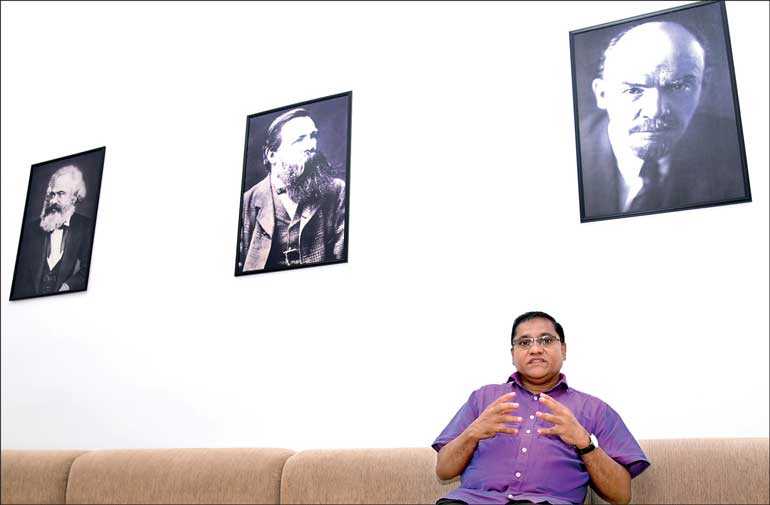
JVP Senior Party Member and former Gampaha District MP Vijitha Herath – Pic by Ruwan Walpola
The Janatha Vimukthi Peramuna (JVP) is contesting the upcoming Parliamentary Elections as the National People’s Power (NPP) with the compass as its symbol. In recent years, the JVP has sought to broaden its party framework and be more inclusive to attract voters tired of ‘politics as usual’ that the two main parties have been engaged in for decades, but it has been an uphill task. Senior Party Member and former Gampaha District MP Vijitha Herath spoke to the Daily FT on the party’s expectations, why – in spite of their disillusionment – people still back traditional parties, and vows to resist any moves by a future SLPP-led Government to
abolish the 19th
Amendment to the
Constitution.
By Chandani Kirinde
Q: What kind of economic policies would the NPP advocate for the country?
A: The basis of our economic policy is in the election manifesto of the NPP, which we unveiled for the 2019 Presidential Election. There are a few areas we focus on. Our main objective is to develop a good education system for the country as this is the key to development.
This will include not only school education but university, tertiary and adult education, which gives wide exposure and moves away from the syllabus-trapped system. Our focus is also on agriculture, where we can move towards self-sufficiency by adopting modern technology for the benefit of the sector. Then there is the industrial sector, which we must develop. Heavy industries are a thing of the past but for example, we see opportunities in software development, where we can make inroads.
Sri Lankans have excelled in this area. There are many things we can develop in this country but there are some things we must import. Adopting a closed economy is not realistic but the economy must be based on giving priority to national interests. This is what the USA, China, India, and most countries are doing. Our problem is we opened the economy in 1977 without any limitations whatsoever. A recent example of how dependent we have become on imports even for the smallest items was illustrated after the outbreak of the COVID-19 pandemic, when we had to get masks from China.
For the success of the economy, we first need a good plan and we need to increase local production. People’s participation and equitable distribution of economic gains among the people can lead to economic prosperity for the country.
Q: President Gotabaya Rajapaksa also lays a great deal of emphasis on local production/industry? Can you find common ground with him?
A: Such policies unfortunately are limited to words and rarely transform into deeds. That is where the problem is. During the previous Rajapaksa administration, they started a program called ‘Api Wawamu, Rata Hadamu’ (let’s grow, and build the country) and gave a great deal of publicity to it but did not 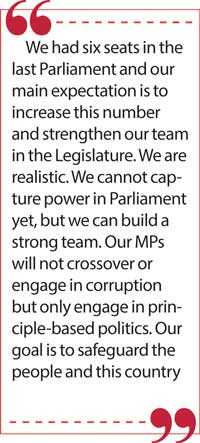 follow through with the project.
follow through with the project.
The concept is good, but this was mostly aimed at attracting votes and was not a genuine attempt to strengthen local production or industry. They say one thing and then sign agreements with multi-national companies to undermine the domestic economy.
Even bilateral agreements, such as the Economic and Technology Co-operation Agreement (ETCA) with India, were initiated by the previous Rajapaksa Government. Most of these commitments give priority to the detriment of local producers/industrialists. They have good concepts but are not applied practically.
Q: Its eight months since Gotabaya Rajapaksa took office. Do you see his policies as different to those of Mahinda Rajapaksa?
A: Most of what the President is saying now were included in the Mahinda Chinthanaya, too. We do not see a difference between the ways the two leaders operate. Only the head has changed.
Q: How do you assess what many see as ‘militarisation’ of the Government structure by the President?
A: The President is ruling with task forces. He has appointed several former military officers as heads of important government institutions, including the Consumer Affairs Authority (CAA). We saw the high-handed way the person appointed to the CAA tried to bring down rice prices, but such high-handed military tactics cannot bring down the cost of living.
Some ministry secretaries, too, have been appointed in the same manner. Many public sector workers are uneasy and unhappy as there is a way the administrative system in the county works and that must be respected. Even though public sector workers have remained subdued in the face of such appointments, it is likely things will erupt after the election. These kinds of appointments are a threat to the civil administration of the country as well as to democracy in the country.
Q: How do you see the Government’s handling of the COVID-19 pandemic situation?
A: There were lapses in handling the situation initially. Had certain measures been taken early on, such as closing the airport and tracing locals who were infected, things could have been handled better. We had an early warning, looking at what was unfolding in other countries. Later, positive steps were taken. We are happy about some of the measures taken but there are some shortcomings as well. We know that the Navy cluster is the biggest amongst military personnel in the world. This is one that occurred because of the failure of the Government to act promptly or provide personal protective equipment (PPEs) to those engaged on the frontline and dealing with the coronavirus.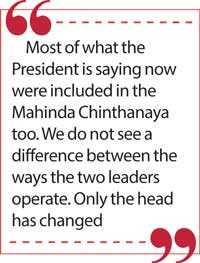
Q: The JVP draws support from Sri Lankans living abroad, mainly workers in the Middle East. How do you see their plight and how have you intervened on their behalf?
A: All the Sri Lankan workers in the ME are ones who have gone abroad temporarily. They have no other country to come to but their motherland. No one can stop them from returning here. They are equally entitled to return home and exercise their franchise, and it is the responsibility of the Government to ensure that.
We can see that many of our workers have not been paid for several months, some have no food or a place to stay. Our missions in these countries have not been given enough funds to help these people. We presented a proposal to the Government and offered to voluntarily work with the returnees in the quarantine centres, but there was no response.
Members of the Red Star Volunteer Force of the JVP who are in these countries have stepped up to help people in the ME to the best of their abilities. Due to the delay on the part of the Government to act, many have gotten infected with COVID-19. The Maldives and India used ships to bring down their nationals, but we failed to do the same.
Q: As a party that has always stood for workers’ rights, what do you think should be priority labour legislation for the new Parliament?
A: Workers have been the first casualty of the COVID-19 pandemic, with many having lost jobs or receiving pay cuts. Many companies have flouted the undertaking they had given the Government to pay at least half the monthly salaries and pay compensation in case workers are laid off. The rights of workers have been violated. Even companies that were making large profits before the pandemic cut salaries and sacked workers as if they had gone bankrupt in two months. While we speak for workers’ rights, it is equally important to safeguard the employers.
The Government must intervene in a more proactive role to safeguard both sides. The Central Bank announced several measures to help businesses affected due to COVID-19, including a debt moratorium, but it has not been implemented properly.
Q: A JVP MP held the post of Chairman of the Committee on Public Enterprises (COPE), the most important parliamentary oversight committee, while other JVP members were active in other committees. Do you think you will be able to retain these positions in the new Parliament?
A: We were able to make some significant changes to the Parliament committee system and contribute to making the committee proceedings more meaningful and more accessible to the public. We must 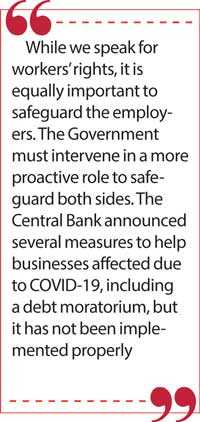 ensure that these are further strengthened in the new Parliament and not bulldozed like the Buwaneka Hotel. A lot of what we can achieve and the pressure we can exert through these committees will depend on the composition of the new Parliament; but we will fight to keep these committees strong.
ensure that these are further strengthened in the new Parliament and not bulldozed like the Buwaneka Hotel. A lot of what we can achieve and the pressure we can exert through these committees will depend on the composition of the new Parliament; but we will fight to keep these committees strong.
Q: Ahead of last November’s Presidential Election, we saw the JVP warm up to the private sector and advocate coexistence with the State sector. We often talk of corruption in the State sector, but the private sector fights shy of transparency and accountability. How can the parliamentary committee be used to bridge this gap?
A: As we saw in the last Parliament, senior office bearers of semi-government institutions, like SriLankan Airlines as well as subsidiaries of the Ceylon Electricity Board (CEB), had to appear before COPE and answer for the financial lapses.
As for the wholly private institutions, we need new laws to make them more transparent and accountable. There must be the same level of transparency and accountability in both the State and private sectors. That is the only way to clean up the system.
We see a disturbing trend where senior public officials and military officials, soon after they retire from government service, get lucrative jobs in the private sector. This means they have links to the State sector, and these are often misused. Take the case of Avant Garde Maritime Services. It employed several Navy commanders after they retired. We see clear conflicts of interest in such instances.
Q: The President wants to abolish the 19th Amendment to the Constitution. As a Party that voted for the Amendment, what is your stance?
A: We will not allow that to happen. The 19th Amendment is a big step in the right direction for 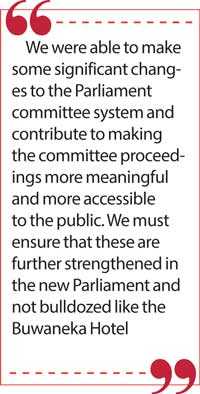 democracy in the country. The independent commissions have functioned effectively under this. The National Elections Commission (NEC) is a good example of how the commissions function independently.
democracy in the country. The independent commissions have functioned effectively under this. The National Elections Commission (NEC) is a good example of how the commissions function independently.
We can see how elections are conducted in a far more peaceful manner, and election-related violence and malpractices are on the decline. It is due to the 19th Amendment that the Election Commission has been able to function without politicians exerting pressure on its members.
Take the appointment of members to senior positions, including the Judiciary. Such appointments were done at the whim and fancy of the President before the 19th Amendment but now it goes through the Constitutional Council. Abolishing the 19th Amendment would mean the country would take a few steps backwards. The 19th Amendment has its shortcomings but these can be amended. Abolishing it is out of the question. We will not allow it to happen.
Q: Will you join other opposition parties if the need arises to prevent any such move?
A: If any moves are made to roll back the gains made towards strengthening democracy in the country, we will join anyone to fight against them. In such an instance, we will put aside political differences and fight together. We cannot allow a slide-back to a one-man show.
Q: Sri Lanka seems to be vacillating between China and India with a rather lopsided foreign policy. How does the JVP view this?
A: We should have a win-win foreign policy where we are not subservient to any country but have cordial relations with all countries. However, the impediment to such a policy is that our foreign policy or our transactions with other countries are dependent on the weight of the commissions that these countries offer to various ministers.
Take the case of the Colombo Light Rail Transit (LRT) project which was to be done with assistance from Japan. That was stopped after this Government came and now, they are looking at China. It was the same game when the Hambantota Port was being leased. We have failed to maintain a consistent 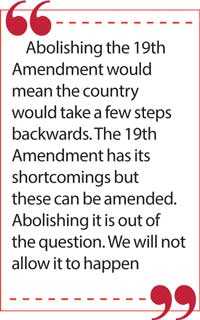 foreign policy or economic policy.
foreign policy or economic policy.
What we have as a policy is based on the interests of ministers who decide on which projects to give them based on how big the commissions they get are. National interests are put aside for personal interests. We advocate a stable foreign policy. That way we can attract more investment from abroad as foreign companies will not have to do deals but have a clear-cut idea on what the rules are.
Q: Most voters express frustration with politicians, calling them corrupt or rogues, but end up voting for the same sort for candidates. Why has a party like the JVP, which campaigns on a platform promoting ‘clean’ candidates, failed to make inroads and capture enough votes at elections despite people’s disillusionment with the two main parties?
A: I will cite a story that Catholics will be familiar with. During the trail of Jesus Christ, the crowds were asked to pick between him, and another prisoner named Barabbas to be released in a customary pardon. The crowds picked Barabbas and not Jesus, and he was crucified. But while no one remembers Barabbas, it is Jesus and what he preached that survives till today. This shows that people are not always wise about the choices they make but regret it later. Here, too, people vote for the same wrongdoers. This will happen on 5 August also. They will vote for the corrupt and the thieves, and then start regretting it before long. There are also the strong party loyalties that are embedded in people, and they remain committed to a party, whatever their shortcomings. We see a change among younger voters, who are more discerning in the way they vote.
Q: What are your Party’s expectations from the upcoming election?
A: We had six seats in the last Parliament and our main expectation is to increase this number and strengthen our team in the Legislature. We are realistic. We cannot capture power in Parliament yet, but we can build a strong team. Our MPs will not crossover or engage in corruption but only engage in principle-based politics. Our goal is to safeguard the people and this country.